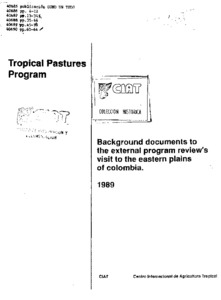Mission
To reduce hunger and poverty, and improve human nutrition in the tropics through research aimed at increasing the eco-efficiency of agriculture.
People
CIAT’s staff includes about 200 scientists. Supported by a wide array of donors, the Center collaborates with hundreds of partners to conduct high-quality research and translate the results into development impact. A Board of Trustees provides oversight of CIAT’s research and financial management.
Values
- Shared organizational ethic
- We respect each other, our partners, and the people who benefit from our work. We act with honesty, integrity, transparency, and environmental responsibility in all of our joint endeavors.
- Learning through partnerships
- We work efficiently and pragmatically together and with partners. Considering our diversity to be a key asset, we adapt readily to change and strive to improve our performance through continuous learning.
- Innovation for impact
- We develop innovative solutions to important challenges in tropical agriculture, resulting in major benefits for the people who support, participate in, and profit from our work.
Members:
Resources
Displaying 801 - 805 of 958Caracteristicas agronomicas de la produccion de raices y tuberculos: implicaciones para el diagnostico
Important agronomic characteristics of common root and tuber crop production systems in the tropics are indicated for crops including cassava, yam, sweet potato, and edible aroids. Brief comments are also included on aspects that help correctly interpret the information obtained during the characterization process. The general context of agricultural production is analyzed, and within this context, the particular case of root crops, where the process of transformation into derived products, at both farm and regional levels, may condition the agronomic practices used.
Background documents to the external program review`s visit to the eastern plains of Colombia
Workshop on Soil Fertility Research for Bean Cropping Systems in Africa (1988, Addis Ababa, Ethiopia). Proceedings
A regional workshop was held in Ethiopia (Eastern Africa) to assess the status, future needs, and methodological issues of soil fertility research for bean cropping systems on the continent. Traditional forms of soil fertility maintenance, diagnosis of soil fertility constraints, nutrient requirements, use of fertilizers, cropping systems and soil fertility, and soil organic matter and the use of green manures and mulching were addressed.
Traditional forms of soil fertility maintenance
Several traditional methods of maintaining soil fertility in bean-based cropping systems are reviewed as follows: visoso, large- scale chitemene, ngoro or matengo pit (Mbinga District, Tanzania), mambwe land-use system of northern Zambia (fundikila), mounds of the Wafipas (SW Tanzania), tumba land-use system (southern Tanzania), guie (central highlands of Ethiopia), mafuku in Zaire, termite mounds, agroforestry, relay intercropping systems, coffee- banana-bean cropping system of the Wahayas of Bukoba (Tanzania), removal of maize tassels (northern Malawi), and storage of nutrients in weeds (




